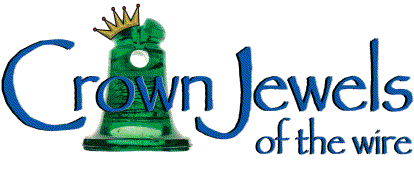Is Your Collecting Really A Business?
by Attorney Clay Konnor
Reprinted from "Crown Jewels of the Wire", April 1992, page 12
Tax Strategies for Hobby-Businesses
In my last article I discussed the insurance impact of insulator collecting.
We touched on the subject of the "Business Pursuit" exemptions in
typical home-owners policies and how it may be advantageous to classify your
collecting as non-business or not a business pursuit. In this article I would
like to briefly discuss the other edge of that sword. When would it be
advantageous to classify your hobby activity as a side or even primary business?
Tax time, that's when.
If your insulator collecting activities enable you to sometimes earn some
money, your collecting may actually be a business and you may be entitled to
some tax benefits. All income generated by a hobby is taxable. Expenses from
carrying on such activity are, of course, not deductible unless offset against
hobby income. For example, if your collecting activities generate $3000.00 of
hobby income, then deductions can be taken up to that amount and are
miscellaneous itemized deductions, provided they exceed two percent of your
adjusted gross income. If your hobby, however, is classified as a side business
you are entitled to additional business-expense deductions without limitation.
Once again we are put in the unsavory position of trying to fit into the
definition of business or non-business. Note that an insurance company in
determining coverage questions will obviously be much broader in their
determination of what a business is than the IRS, so as to deny coverage. The
Internal Revenue Service and the courts look at numerous factors in determining
whether an activity is a hobby or a business. The most important factor is
whether your predominant motive and goal in doing the activity is profit. Some
of the factors that are used to determine whether an activity is primarily
engaged in for profit are:
The business-like manner in which the activity is conducted. For example, how
are the books kept, what operating procedures are used, etc.
The degree of expertise of the tax payer in the field.
The time and effort that is devoted to the activity. The more personal time
and greater effort, the easier it is to establish profit motive.
The profit expectation from the activity and the assets used in the activity.
The prospect that the assets will appreciate in value and produce an eventual
gain figures favorably in showing a profit motive. (Insulators are appreciating
and should sell for more five years from now).
The tax-payer's track record of income or loss from the activity. Losses
during the initial start-up years do not preclude establishing a profit motive.
Many years of consistent losses, however, may be less favorable, although not
necessarily fatal.
The amount and frequency of occasional profit.
Financial state of the taxpayer. A taxpayer's lack of income from another
source may be relevant.
The degree of personal pleasure or satisfaction derived from the activity.
The presence of recreational or personal motive may indicate a lack of profit
motive.
Courts will generally apply a presumption that an activity that turns a
profit in three or more of five consecutive years is a business. This is not,
however a steadfast rule. The upshot of this is that there may be a way to
deduct the gas, mileage and wear-and-tear on your car going to and from shows,
the loss you experienced in buying that big collection and so on.
Remember that
the first place, and sometimes the only place, an insurance company will look to
determine business pursuit in deciding coverage questions is your tax returns.
If you take the position that your collecting activities are actually a business
for tax reasons, you will certainly lose the ability to classify them as
non-business pursuit for insurance purposes.
These issues have been discussed
here in a very brief and general manner. If you have considering classifying
your collecting activities as a business for tax reasons, I high recommend you
consult with an accountant or tax attorney. .
| 